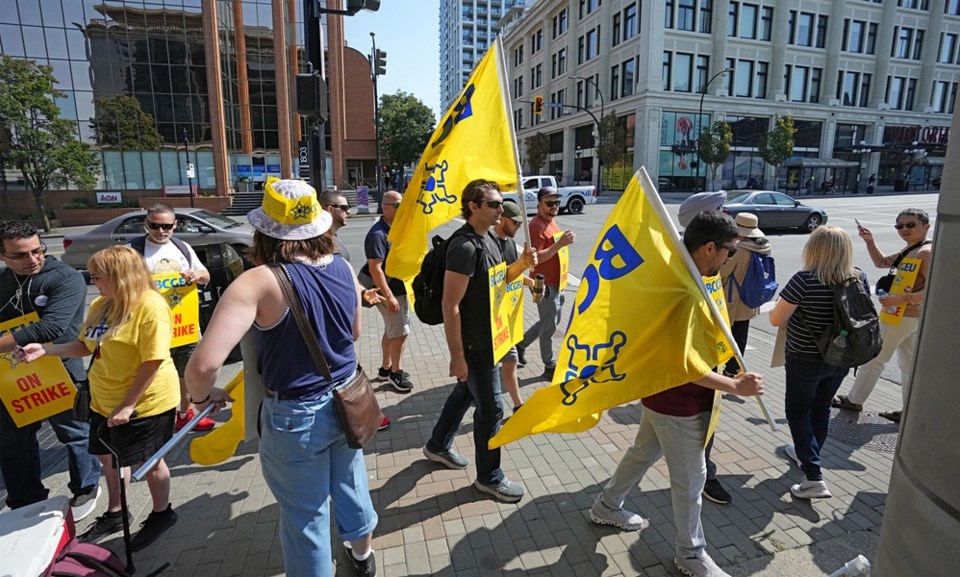The first strike day by government workers wasn’t defined by the location or size of its picket lines on Tuesday, but by the political muscle that showed up to help it push back against the New Democrat government.
Leaders from the BC Teachers’ Federation, BC Nurses’ Union, BC Federation of Labour and Canadian Union of Public Employees travelled to Victoria to attend BC General Employees’ Union president Paul Finch’s opening strike rally.
“Thank you for your support,” said Finch, who highlighted attendees like BCNU president Adriene Gear. “We’re going to be there to support you.”
The solidarity is an early sign that the BC NDP government may find it harder to divide and conquer the organized labour movement than it first thought.
New Democrats were quite hopeful they’d cracked the code last week after getting the Hospital Employees’ Union to break ranks with its brothers and sisters and agree to a “framework” deal for wage increases far below what the BCGEU is fighting for.
Premier David Eby’s administration wanted other unions to also conclude that the BCGEU’s 8.25 per cent wage demand over two years was unrealistic, and settle for 3.5 per cent instead.
After all, the government is dead broke. With a record-breaking deficit of more than $10 billion this year, it can’t even afford to fund its own offer, which will cost almost $2 billion cumulatively over two years.
Finch wasted no time flipping the government’s talking points back at it.
“Public servants did not create this deficit,” he said.
“What created this deficit is poor governance over spending on capital projects, tax breaks for the wealthy, tax breaks on key resource projects that every British Columbian should be receiving benefits from.”
The size of the frontline civil service is in line with the population, said Finch, but the number of excluded management positions (including political appointees) has grown at twice the rate.
“That’s unacceptable,” he said. “You talk to people here today, they’re tired of being micromanaged. But also, those excluded managerial positions make, on average, $45,000 a year more.”
Finch said the NDP government is “out of touch, not just with our membership but with the general public.”
Similar sentiments were echoed by union leaders from CUPE, the BCTF and BCNU on Tuesday.
Teachers are still waiting for the government to honour its election promise to put education assistants in every elementary school classroom. Nurses want continued guarantees on patient ratios, and protection for benefits. Different fights, but similar frustrations with a BC NDP that unions have now three times helped elect into power.
Finance Minister Brenda Bailey urged the BCGEU to return to the bargaining table, but repeated the line that everyone has to tighten their belts during tough economic times. The government continues to point the finger at Donald Trump for its economic problems, leaving out the fact its structural deficit began two years before the U.S. president returned to power.
The danger in lowballing public servants is they might figure out they’re getting a raw deal because the NDP spent all the cash like there was no tomorrow.
Is the solution, then, really to balance the books off the backs of workers?
That’s exactly the kind of move New Democrats used to sneer at in opposition. Remarkable how fast the party of labour can forget its friends when it gets too comfortable in power.
Rob Shaw has spent more than 17 years covering B.C. politics, now reporting for CHEK News and writing for The Orca/BIV. He is the co-author of the national bestselling book A Matter of Confidence, host of the weekly podcast Political Capital, and a regular guest on CBC Radio.
New newsletter alert! Stay ahead of the curve in B.C. politics. Get expert political analysis delivered straight to your inbox, plus inside scoops and other stories from across the province. Sign up here for the Capital & Coast newsletter.



